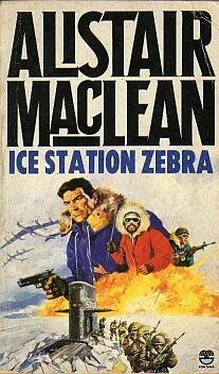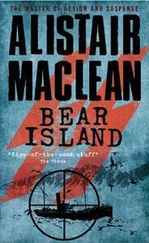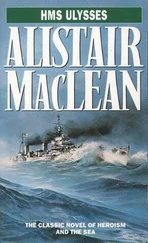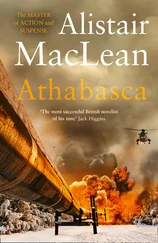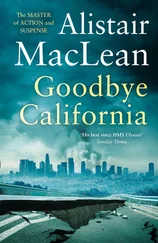"Aren't you rather overlooking the fact that if the killer did us in, he'd also be doing himself in?"
"I don't necessarily share your belief in his sanity. All killers are a little crazy. No matter how excellent their reasons for killing, the very fact that they do kill makes them abnormal. You can't judge them by normal standards."
He was only half right, but unfortunately that half might apply in this case. Most murderers kill in a state of extreme emotional once-in-a-lifetime stress and never kill again. But our friend in this case had every appearance of being a stranger to emotional stress of any kind — and, besides, he'd killed a great deal more than once.
"Well," I said doubtfully, "perhaps. Yes, I think I do agree with you." I refrained from specifying our common ground for agreement. "Who's your candidate for the high jump, Commander?"
"I'm damned if I know. I listened to every word that was said this morning. I watched the face of each man who spoke — and the faces of the ones who weren't speaking. I haven't stopped thinking about it since and I'm still damned if I have a clue. How about Kinnaird?"
"He's the obvious suspect, isn't he? But only because he's a skilled radio operator. I could train a man in a couple of days to send and receive in Morse. Slow, clumsy, he wouldn't know a thing about the instrument he was using, but he could still do it. Any of them may easily have been competent enough to operate a radio. The fact that Kinnaird is a skilled operator may even be a point in his favor."
"Nife cells were removed from the radio cabin and taken to the laboratory," Swanson pointed out. "Kinnaird had the easiest access to them. Apart from Dr. Jolly who had his office and sleeping quarters in the same hut."
"So that would point a finger at Kinnaird or Jolly?"
"Well, wouldn't it?"
"Certainly. Especially if you will agree that the presence of those tinned foods under the lab floor also points a finger at Hewson and Naseby, both of whom slept in the cookhouse, where the food was stored, and that the presence of the radio-sonde balloon and the hydrogen in the lab also points a finger at Jeremy and Hassard, one a met officer and the other a technician who would have had the easiest access to those items."
"That's right, confuse things," Swanson said irritably. "As if they weren't confused enough already."
"I'm not confusing things. All I'm saying is that if you admit a certain possibility for a certain reason, then you must admit similar possibilities for similar reasons. Besides, there are points in Kinnaird's favor. He risked his life to go back into the radio room to bring out the portable transmitter. He risked almost certain suicide, when he tried to go in the second time to bring out his assistant, Grant, and probably would have died if Jeremy hadn't clobbered him. Look what happened to that man Foster who went in there immediately afterward with a wet blanket over his head: he never came out.
"Again, would Kinnaird have mentioned the Nile cells if he had any guilt complex about them? But he did. That, incidentally, might have been why Grant, the assistant radio operator, collapsed in there and later died — Kinnaird had told him to bring out the other Nife cells, and he was overcome because he stayed there too long looking for things that had already been removed from the hut. And there's one final point: we have Naseby's word for it that the door of the radio room was jammed, presumably by ice. Had Kinnaird been playing with matches a few moments previously, that door wouldn't have had time to freeze up."
"If you rule Kinnaird out," Swanson said slowly, "you more or less have to rule Dr. Jolly out, too." He smiled. "I don't see a member of your profession running around filling people full of holes, Dr. Carpenter. Repairing holes is their line of business, not making them. Hippocrates wouldn't have liked it."
"I'm not ruling Kinnaird out," I said. "But I'm not going off half cocked and pinning a murder charge on him, either. As for the ethics of my profession, would you like a list of the good healers who have decorated the dock in the Old Bailey? True, we have nothing on Jolly. His part in the proceedings that night seems to have consisted in staggering out from the radio room, falling flat on his face, and staying there till pretty near the end of the fire. That, of course, has no bearing upon whatever part he might have taken in the proceedings prior to the fire. Though against that possibility there's the fact of the jammed door, the fact that Kinnaird or Grant would have been almost bound to notice if he had been up to something. Jolly's bunk was at the back of the radio room, and he would have had to pass Kinnaird and Grant to get out, not forgetting that he would also have to stop to pick up the Nife cells. And there is one more point in his favor — an apparent point, that is. I still don't think that Benson's fall was an accident, and if it was no accident it is difficult to see how Jolly could have arranged it while he was at the foot of the sail and Benson at the top, and it's even more difficult to see why he should have stood at the foot of the sail and let Benson fall on top of him."
"You're putting up a very good defense case for both Jolly and Kinnaird," Swanson murmured.
"No. I'm only saying what a defense lawyer would say."
"Hewson," Swanson said slowly. "Or Naseby, the cook. Or Hewson «and» Naseby. Don't you think it damned funny that those two, who were sleeping at the back or east side of the cookhouse, which was the first part of the hut to catch fire, should have managed to escape while the other two — Flanders and Bryce, wasn't it? — who slept in the middle should have suffocated in there? Naseby said he shouted at them and shook them violently. Maybe he could have shouted and shaken all night without result. Maybe they were already unconscious — or dead. Maybe they had seen Naseby or Hewson or both removing food supplies and had been silenced. Or maybe they had been silenced «before» anything had been removed. And don't forget the gun. It was hidden in the gas tank of the tractor, a pretty damned funny place for a man to hide anything. But nothing funny about the idea occurring to Hewson, was there? He was the tractor driver. And he seems to have taken his time about getting around to warning Captain Folsom. He said he had to make a wide circuit to avoid the flames but apparently Naseby didn't find it so bad when he went to the radio room. Another thing — a pretty telling point, I think, he said that when he was on the way to the bunkhouse the oil drums in the fuel store started exploding. If they only started exploding then, how come all the huts — the five that were eventually destroyed, that is — were already uncontrollably on fire? They were uncontrollably on fire because they were saturated by flying oil so the first explosions must have come a long time before then. And, apart from warning Folsom — who had already been warned — Hewson doesn't seem to have done very much after the fire started."
"You'd make a pretty good prosecuting counsel yourself, Commander. But wouldn't you think there's just too much superficially against Hewson? That a clever man wouldn't have allowed so much superficial evidence to accumulate against him? You would have thought that at least he would have indulged in a little fire-fighting heroics to call attention to himself."
"No. You're overlooking the fact that he would never have had reason to expect that there would be any investigation into the causes of the fire. That the situation would never arise where he — or anyone else, for that matter-would have to justify his actions and behavior if accusations were to be leveled against him."
"I've said it before and I say it again. People like that «never» take a chance. They always act on the assumption that they «may» be found out."
Читать дальше
Конец ознакомительного отрывка
Купить книгу
